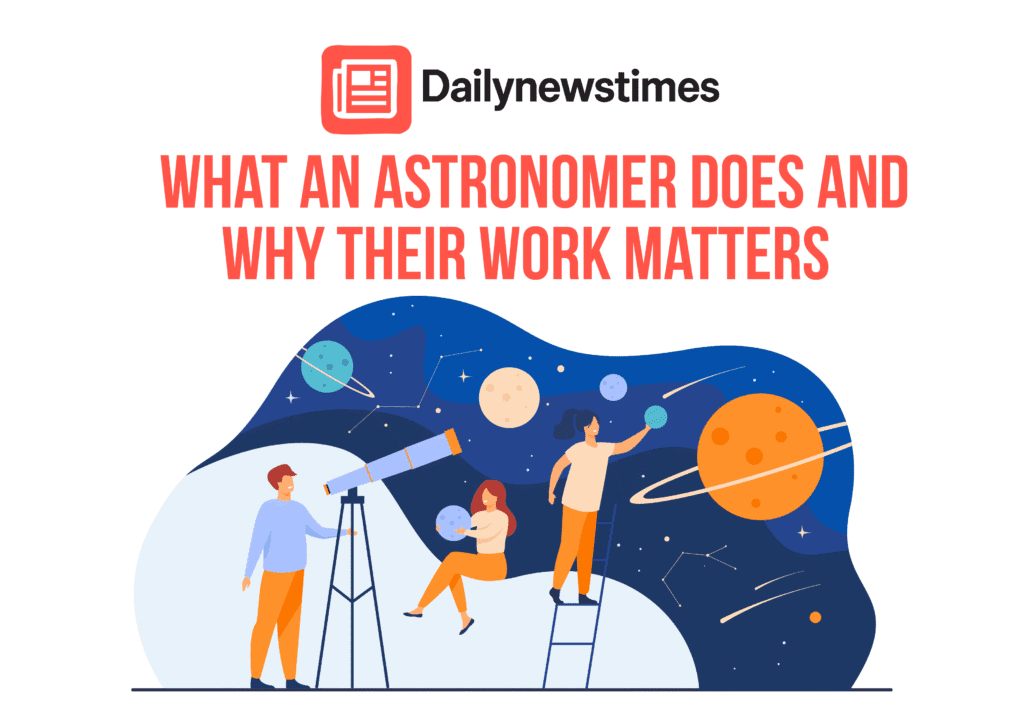Ever looked up at the night sky and wondered who’s actually studying those twinkling lights? An astronomer is more than just a stargazer. They’re professional scientists who explore the origin, structure, and behavior of the universe—from stars and galaxies to black holes and exoplanets. It matters because astronomers help answer fundamental questions about where we come from, where we’re going, and even whether we’re alone in the cosmos.
What Exactly Is an Astronomer?
At its core, an astronomer studies celestial bodies and cosmic phenomena using telescopes and data analysis. According to the UK’s National Careers Service, they investigate the origin and structure of things like planets, stars, galaxies, and black holes.
They might be classified as:
- Observational astronomers, who collect data via optical, radio, or space telescopes.
- Theoretical astrophysicists, who use math and computer models to explain cosmic processes.
Both roles often overlap—modern astronomers usually do a bit of both observational and theoretical work.
How You Become an Astronomer
Education Path
Most astronomers start with degrees in physics or astronomy and complete a PhD before joining research institutes or universities (Wikipedia – Astronomer). The process often includes:
- Undergraduate courses in math, physics, and astronomy
- Graduate-level research and coursework
- A dissertation based on original research
- Technical, coding, and proposal-writing training (AAS Career Page, Wikipedia – American Astronomical Society)
Key Skills Required
According to the American Astronomical Society (AAS), astronomers need strong skills in:
- Critical thinking and problem solving
- Programming (especially Python) and statistical analysis
- Project management and grant-writing
- Teaching, presenting, and networking
What Do Astronomers Actually Do?
Observational Tasks
Astronomers spend time working with equipment at observatories, collecting data on celestial objects. They might:
- Observe galaxies, stars, exoplanets, or cosmic events
- Work with observatory engineers to calibrate telescopes and systems
Data Analysis & Theoretical Modeling
After gathering data, they analyze it and create models—often using high-performance computing—to explain what they see.
Research & Publication
Writing proposals for telescope time or grants, publishing in academic journals, and presenting at conferences are key parts of an astronomer’s work (AAS Career Page).
Teaching & Mentoring
They often teach undergraduate and graduate students, mentor research assistants, and engage in public outreach.
Instrumentation & Support
Designing and maintaining astronomical instruments also falls under their duties, especially in larger observatories.
Why Astronomers Play a Big Role
Astronomers push the boundaries of human knowledge: from mapping the cosmic microwave background to discovering exoplanets and probing black holes. Their work even has practical spinoffs—like GPS, imaging sensors, and advanced computing.
- Public engagement: Amateurs often chip in via citizen science—like tracking meteors or classifying galaxies—helping professionals make discoveries (Wired: Citizen Space Science).
- Inspiring diversity: Astronomers like Lisa Kaltenegger and Annie Walker, the UK’s first female professional astronomer, show how inclusive the field continues to become.
Pros and Cons of Being an Astronomer
Pros
- Work is intellectually thrilling—solving cosmic mysteries
- Combine observation, theory, and cutting-edge tech
- Opportunities to teach and inspire the next generation
Cons
- Long training path, often 5–7 years for PhD
- Funding is competitive—grant writing can be stressful
- Jobs are limited—tenure-track openings are rare
Tips for Aspiring Astronomers
- Focus early: Excel in math and physics during high school
- Start research early: Summer REU programs or faculty-led projects are crucial
- Learn coding: Python, data analysis, and modeling are essential
- Get public-facing: Share your work via blogs, science fairs, or outreach
- Publish and network: Present at conferences and join societies like AAS
FAQs About Astronomers
Q: Do astronomers spend nights on observatories?
Only occasionally—observations are scheduled and often automated; most days are spent on analysis and writing.
Q: Can amateurs contribute?
Absolutely! Citizen scientists submit valuable data on meteors, variable stars, and more.
Q: Is astronomy well-paid?
In the U.S., astronomers earn around $128,000 per year on average, with physicists and researchers often higher.
Conclusion and Next Steps
Astronomers aren’t just stargazers—they’re highly educated scientists decoding the universe through observation, modeling, and innovation. They teach, publish, secure grant funding, and engage with the world through outreach. Pursuing this career requires dedication, strong STEM skills, and a curious mind—but the payoff is playing a part in exploring humanity’s cosmic origins.
Here’s what you can do now:
- Take physics and math seriously in school
- Reach out to local observatories or university labs for internships
- Join astronomy clubs or amateur groups
- Practice coding and data analysis
- Follow discoveries: James Webb Space Telescope findings, new exoplanet announcements, and more
Becoming an astronomer means joining a vibrant, global community searching for answers to life’s biggest questions—and that’s something worth striving for.

